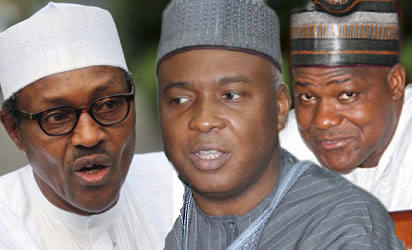
But the President looked at the document and discovered that the details of how it would be implemented were conspicuously missing. The President therefore, refused to append his signature for fear that when the details are eventually presented, there may be conflict between what he signed into law and what should reasonably be implemented.
Indeed, the National Assembly Committee on Appropriation was honest enough to admit that it actually sent the budget to the President for his assent without the details, but that it was done to stop the economy from stagnating.
The Co-Chairman of Appropriation in National Assembly, Hon. Abdulmumin Jibrin, said: “in order for the nation to move forward and avoid stagnation of administrative processes, the tradition is that the bill is passed and forwarded to the Presidency for assent, while the lawmakers continue to work on the details. There is nothing abnormal about this practice and yet nothing abnormal about a President assenting a budget before or after seeing the details. In any case, the budget details are usually sent within a week or two after passing the budget.
“In view of the inconsistencies, errors, omissions and padding that characterized the 2016 budget, it would be unpatriotic of the National Assembly to forward the budget details without being extra-careful, meticulous and cautious in discharging its duties. This is to ensure we do not make same mistake that the executive made.”
The Presidency on its part, regarded the development as confirming the speculation that the National Assembly either did not complete work on the budget or is playing politics with the documents, saying that the President is very anxious to sign the budget so that implementation can start immediately to ease the tension in the economy and polity.
The Presidency accused the National Assembly of trying to shift the blame for the delay in the budget implementation to President Buhari, a situation the Presidency described as “sabotage,” adding: “the president has been handicapped in signing the bill because he does not know what is contained in the details and what adjustments the National Assembly must have made to the proposal sent to them.”
What is obvious in the positions of the President and the National Assembly is the zeal by the two to start implementing the budget, which has taken this long: the nation had just passed the first quarter of the year. Indeed, while the National Assembly wants to be seen as not being the source of delay of the budget, the Presidency is trying to avoid the mistakes of the past; the mistakes, most of which were deliberate and glaring, which, at best, had always been ignored and swept under the carpet.
We in Greenbarge Reporters honestly commend the National Assembly, at least for its unmistakable determination to give the nation a workable budget, and trying to beat the time. But we want to remind the lawmakers of the kind of government President Buhari is determined to run: a government of accountability; a government in which he said he would accept responsibility for whatever happens. This is predicated on the fact that if the budget gets stuck in the process of implementation, it is him that accusing fingers would be pointing and not the National Assembly.
And therefore, if, as the National Assembly said, the tradition is to send the budget for the President’s assent and then details follow a week or two after and the President now insists that he needs both the highlights and the details, it only means that the President wants a change from the tradition, provided such change from the tradition would not conflict or violate the constitutional provisions.
We believe, once again that the President and the National Assembly are focused on putting the nation on the right path to real development in all fronts, but that the method the two are trying to adopt differs. The two sides only need to take their time to understand each other’s feelings and method for the purpose of achieving the common goal, which, we repeat, is the same. We do believe that it is too early in the day for one to begin to insinuate ‘sabotage’ against the other.
We pray fervently that both the executive and the legislature would move quickly to resolve this lingering budgetary crisis and give Nigerians the budget that would improve their living conditions.
Above all, we pray that the two sides would work hard to avoid similar crisis occurring in the remaining life of this administration. [myad]